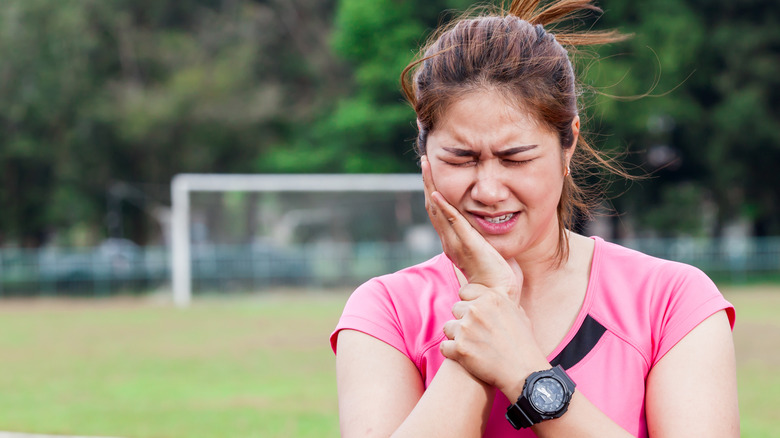Exercise Has An Unexpected Effect On Your Teeth
Even a small amount of exercise, no matter how intense, can have numerous health benefits. It can help reduce the risk of heart disease, diabetes, and stroke; improve brain function; and enhance overall physical health. However, you may not realize that exercise can also have a negative impact on oral health. Surprisingly, a study published in the Scandinavian Journal of Medicine & Science in Sports in 2014 revealed that individuals who regularly engage in physical exercise have more eroded tooth enamel than their sedentary counterparts.
How can exercise, which is so good for our overall fitness, affect our teeth negatively? There are actually many factors at play, including the amount of saliva produced during exercise, the levels of alkaline in the mouth, and the physical stress that our teeth undergo. But don't worry; being aware of these potential dental issues can help you take steps to counteract any harmful effects while still enjoying the many benefits of physical activity.
The link between exercise and dental erosion
The 2014 study published in the Scandinavian Journal of Medicine & Science in Sports examined the relationship between oral health and endurance training. The study comprised a group of 35 triathletes and a control group of equal size who did not exercise regularly. The research included a comprehensive oral examination, evaluations of tooth erosion and caries (commonly called cavities), saliva testing, and detailed questionnaires on participants' dietary habits, beverage consumption, and oral hygiene practices.
The most remarkable finding was that endurance athletes displayed a significantly higher prevalence of dental erosion compared to non-exercising individuals. While athletes and non-exercisers had a similar rate of cavities, athletes experienced a decrease in saliva flow rate and an increase in saliva pH during exercise. On top of that, the study also showed that the more time athletes spent on training, the higher their risk of developing cavities.
Saliva is a complex fluid that is crucial in keeping your mouth healthy. It is a natural cleansing agent that helps remove food particles and bacteria from teeth and gums, preventing plaque buildup and cavities. According to the National Institute of Dental and Craniofacial Research (NIDCR), saliva contains critical minerals like calcium and phosphate, which help to remineralize tooth enamel and repair early signs of decay. A balanced pH helps neutralize acids produced by bacteria, reducing the risk of tooth erosion and decay.
Other dental risks of physical activity
Exercise might cause some other unexpected dental issues. For instance, open-mouth breathing, teeth grinding, and dental injuries can be common problems that may arise during challenging workouts and competitive sports. When we exercise, we tend to breathe through our mouths to take in more oxygen. However, this can cause the mouth to become dry as the saliva evaporates quickly. Mouth breathing can also cause gum irritation as the protective layer of saliva decreases, leaving the gums exposed to potential damage (per Harvard Health Publishing).
Athletes put a lot of hard work and effort into their training, and this can sometimes lead to physical stress and strain. As a result, they may unconsciously grind and clench their teeth, which can cause damage to their teeth and jaw and leave their muscles feeling sore. Grinding and clenching can also wear down the tooth enamel over time, increasing the risk of cavities and dental sensitivity. A study published in 2023 in Current Sports Medicine Reports showed that athletes may be at an increased risk for developing temporomandibular joint disorders (TMJ) that cause discomfort and pain in the jaw area.
Contact sports and high-impact training can also put you at risk for dental injuries. From broken teeth to jaw fractures, these injuries can seriously impact your oral health.
Proactive measures to prevent dental issues
If you want to reap the benefits of regular exercise, you must take a proactive approach to protect your oral health. One simple step you can take is to make sure you're keeping your mouth hydrated by drinking plenty of water during your workouts (per NIDCR). This can help maintain a healthy saliva flow rate and prevent dry mouth caused by open-mouth breathing. Also, avoid sugary sports drinks as they can lead to tooth decay.
If you play contact sports or engage in high-risk activities, protect yourself from dental trauma. A custom-fitted mouthguard is the best way to shield your teeth and jaw from injury (per Cleveland Clinic).
Since teeth grinding and clenching can be stress-induced, consider adding some stress management techniques to your routine. These could include things like mindfulness exercises, relaxation methods, or even chatting with a dentist or dental specialist for some helpful advice on how to manage bruxism.
To maintain good oral hygiene, brush twice daily and floss regularly. Regular dental checkups are also essential to detect and manage any dental issues. By understanding the impact of exercise on your dental health and taking necessary precautions, you can stay in top physical condition without worrying about any unforeseen dental issues.




